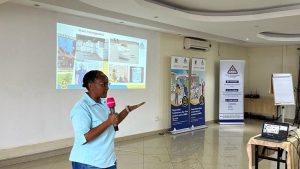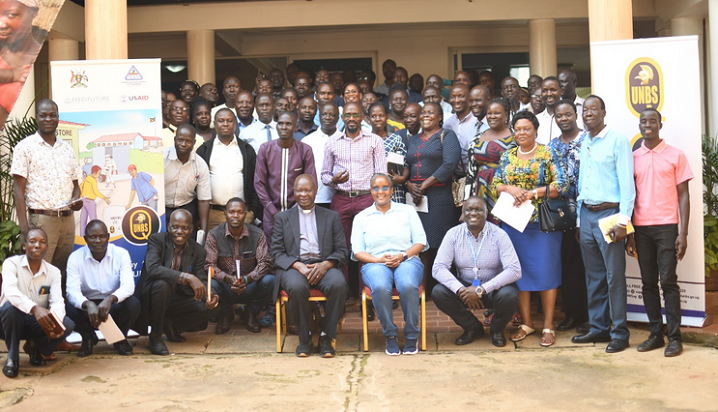UNBS staff with other stakeholders from Acholi in a group photo
The Uganda National Bureau of Standards (UNBS) has rallied stakeholders in the Acholi Sub-region to join hands in the fight against the production and sale of substandard goods in a bid to promote food safety.
This call was made during the ongoing standards sensitization meetings for policymakers, local government officials, heads of education institutions, and schools organized by UNBS in partnership with USAID Feed the Future Uganda Inclusive Agricultural Market Activity (FtF IAM) program in Gulu City.
Ms. Patricia Bageine Ejalu, the Deputy Executive Director in charge of Standards at UNBS says whereas UNBS is mandated with the development, promotion and enforcement of standards in the country, the fight against substandard production doesn’t rest solely in their hands.
Ms. Ejalu says stakeholders, especially the local government, and community leaders have a big stake in partnering with UNBS to monitor the establishment of factories that produce and distribute products to ensure that the products on the markets conform to Uganda’s quality standards.

Ms. Ejalu particularly hinted at the mushrooming milling factories in the region and other parts of the country, majority of which she says don’t conform to the minimum standards yet their establishment and operation could have been evaluated and closely monitored by the local government.
“Before UNBS comes in, isn’t that something the local government can handle? surely UNBS cannot be at every doorstep, we need to work together, government was designed with both national and local level structures and we should collaborate to serve Ugandans,” says Ms. Ejalu.
She notes that the food value chain needs the involvement of every stakeholder to ensure the production of quality products to safe guard the lives of Ugandans.
Ms. Ejalu also raised concerns about the need to change the mindset of the farmers so that they adjust and adopt modern and standards recommended post-harvest handling practices, especially for cereals and grain products that are heavily consumed in schools to prevent the risk of aflatoxin that spreads cancer.
UNBS is already working closely with the Ministry of Education and Sports to ensure the standard of food served in schools is of good quality and does not compromise the health of learners and all education institutions and schools are urged to support the initiative.
The Gulu Resident City Commissioner Jane Frances Amongin Okili who was the chief guest at thesensitization workshops lauded UNBS’s initiative and described it as timely in ensuring the safety of food in the local market and community.
Ms. Okili says the safety of children in school must be a collective responsibility undertaken by all stakeholders to ensure they eat the right food from the right source.
“If our children eat well from home, the same should be done to them at schools. we have a role to play in making sure that we buy quality, not quantity products for these children,” She said.
A number of stakeholders in the region have welcomed the move by UNBS to conduct the regional sensitizations on food safety but stressed that compliance still remains a key challenge in the region.
Mr. Anthony Ojok, the Chairperson, of the School Management Committee (SMC) in Pader District faulted some grain suppliers for failing to observe the standards of their produce supplied to schools.
He also notes that there are limited spot checks for food products that are taken to schools and communities arguing that UNBS should be supported further to conduct regular quality and standards checks across the country.
Pido Joe Cankara, the Director of Studies at Koch Goma Secondary School in Nwoya District on the other hand, says poor storage facilities in most schools are a great challenge to food quality. He called on school admistrators to take an interest in improving food storage to ensure quality food is provided for learners.





